I will discuss the Indiana Professional Licensing Agency being the single authority for the Professional Licensing and regulation of the different fields across Indiana.
This agency supervises different licensing boards and maintains uniform standards, orderly systems, and safety for the public. To understand how professional licenses are coordinated throughout Indiana, one need understands the significance of professional licensing board hierarchy.
Key Point & Indiana Professional Licensing Agency List
| Board/Committee | Key Point |
|---|---|
| Medical Licensing Board of Indiana | Regulates and licenses physicians and surgeons practicing in Indiana. |
| Indiana State Board of Nursing | Oversees nursing licenses and enforces nursing practice standards. |
| Indiana Board of Pharmacy | Regulates the practice of pharmacy and licenses pharmacists and pharmacies. |
| Indiana Optometry Board | Licenses optometrists and regulates optometry practice in Indiana. |
| Board of Chiropractic Examiners | Licenses chiropractors and monitors chiropractic practice standards. |
| Indiana State Board of Dentistry | Regulates dental professionals and ensures compliance with dental laws. |
| State Psychology Board | Licenses psychologists and oversees ethical practice standards. |
| Indiana Physical Therapy Committee | Licenses physical therapists and ensures adherence to therapy guidelines. |
| Respiratory Care Committee | Regulates respiratory therapists and certifies respiratory care practices. |
| Occupational Therapy Committee | Licenses occupational therapists and monitors therapy standards. |
1.Medical Licensing Board of Indiana
The Indiana Professional Licensing Agency directs the Medical Licensing Board of Indiana and consolidates the regulation of numerous professional licenses in the state.
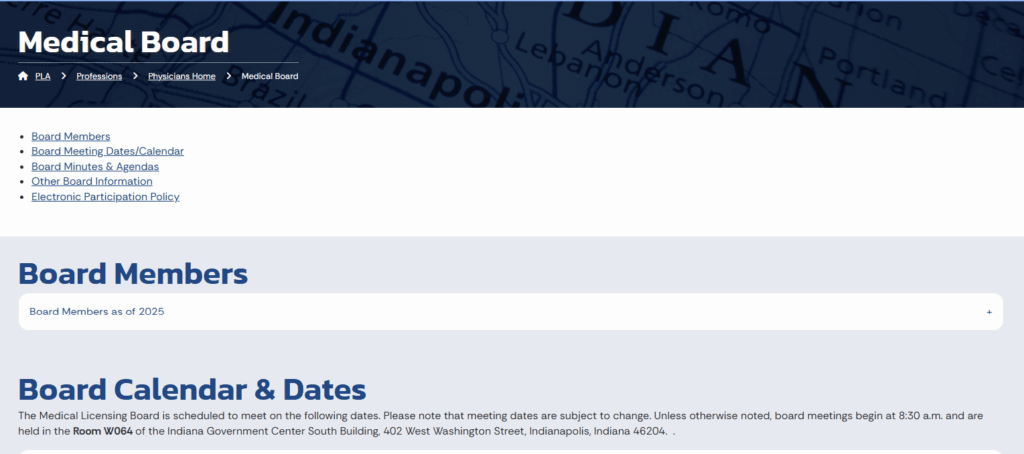
This system makes oversight easier and assures uniformity across many health occupations. What makes the Indiana Professional Licensing Agency distinct is its single umbrella role which enhances the efficacy and clarity of processes related to licensing, discipline, and consumer protection.
Such an approach helps in the provision of quality healthcare by supporting professionals and ensuring public safety throughout the region.
Features
- Centralized Licensing Authority: Oversees the licensing and regulating of multiple professions within Indiana, thereby optimizing processes intake.
- Standardized Processes: Achieves uniform application of policies whilst streamlining renewals and discipline actions.
- Public Protection: Maximally protects public health by enforcing professional standards, as well as resolving disputes in a timely manner.
2.Indiana State Board of Nursing
Indiana State Board of Nursing falls under the Indiana Professional Licensing Agency which centrally licenses various professions for coherence and orderly management.

This agency model simplifies the licensing process, improves resource allocation, and enables faster response to changes in regulations.
The Board of Nursing, having been placed under this umbrella, is provided with coordinated supervision which improves the safety of the public and accountability of the professional. The public nursing in this are protected while standards are upheld that safeguard patients across the entire state of Indiana.
Features
- Physician Licensing: Issues and reissues practice licenses to physician and surgeons residing within Indiana.
- Professional Oversight: Supervises medical legal compliance and professionally deviated acts.
- Public Safety: Empowers consumer patients by validating that the practitioner has the requisite education and skills.
3.Indiana Board of Pharmacy
The Indiana Board of Pharmacy functions under the Indiana Professional Licensing Agency, which is a one-stop shop for licenses across a variety of professions.

This configuration allows the Board to take advantage of the system’s efficiency in terms of regulatory and administrative s streamlining.
This improves the Board of Pharmacy’s capability to supervise pharmacists and pharmacies, which safeguards the proper usage of medications. Systematic control enhances the trust of the public and the quality of professional services in the health system of Indiana.
Features
- Nurse Credentialing: Issues licenses to registered nurses, licensed practical nurses and nurse practitioners.
- Practice Regulation: Define and approve programs for nursing education and professional practices.
- Discipline & Enforcement: Resolves challenges as per the response document and takes measures of a punitive nature geared to protecting the patient.
4.Indiana Optometry Board
The Indiana Professional Licensing Agency organizes the governance of different professions in synergy with the Indiana Optometry Board.
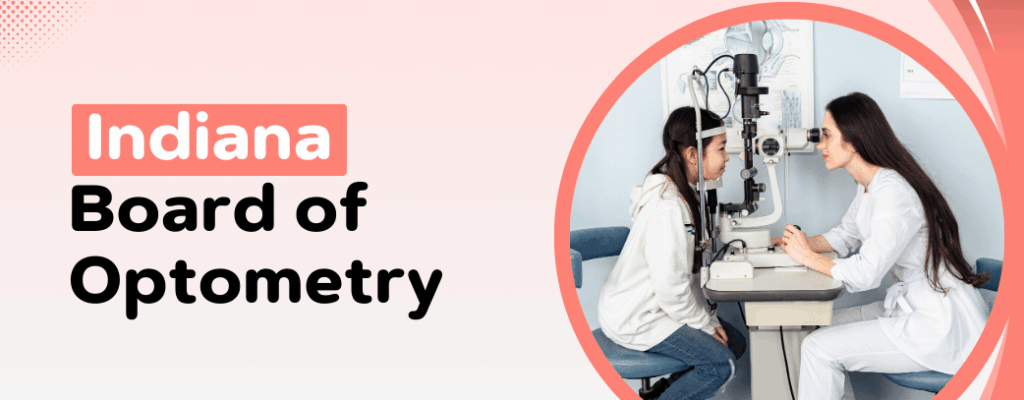
The system improves cooperation and streamlines licensing processes, all while maintaining quality control for optometrists throughout the state. The consolidation of the Indianan Professional Licensing Agency enables the Board to effectively manage licensure, compliance, public safety and maintain defense barriers through pooled resources and knowledge.
This system ensures an accurate standard of eye care services, while also ensuring patient welfare by implementing strict professional requirements throughout the state.
Features
- Pharmacist Licensing: Grants certificates of qualification to practicing pharmacists and pharmacy aides.
- Pharmacy Regulation: Controls pharmacies to ensure the proper distribution of medications.
- Public Safety: Regulates the law regarding the dispensing and practicing of pharmacy.
5.Board of Chiropractic Examiners
The Indiana Professional Licensing Agency incorporates The Board of Chiropractic Examiners within its framework. Like other agencies, the IPWA consolidates various boards into a single coherent unit.
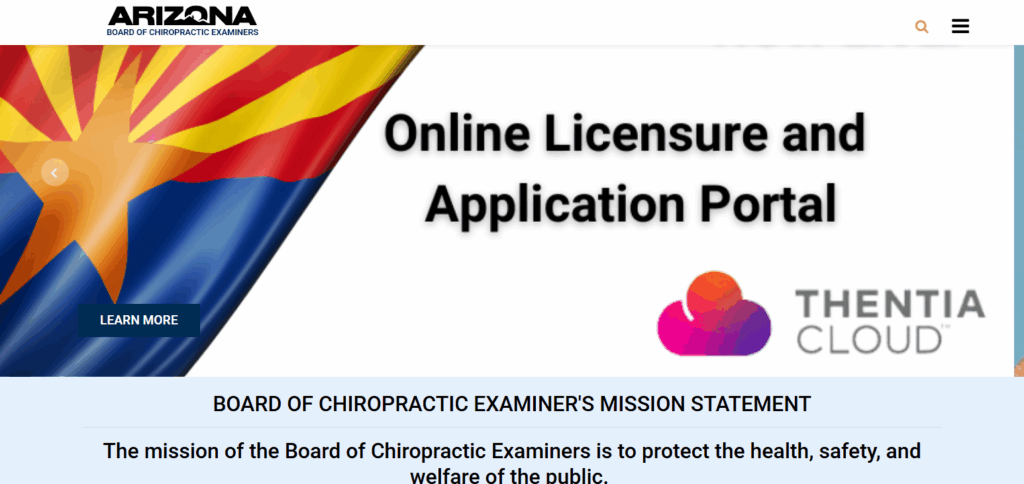
This system enhances the oversight of chiropractors by integrating the processes of licensing, renewals, and discipline, and increasing efficacy and uniformity. This consolidation affords the Board access to shared resources and processes which aids in maintaining the high professional standards demanded of chiropractors.
This approach facilitates efficient governance while enhancing public safety, protection, and access to safe and effective chiropractic services in the state of Indiana.
Features
- Optometrist Licensing: Regulates optometry professionals and issues licenses to qualified candidates.
- Practice Standards: Governs patient care and sets requirements for professional advancements, such as continuing education.
- Patient Protection: Safeguards the public from unqualified practitioners and unethical eye care services.
6.Indiana State Board of Dentistry
The Indiana State Board of Dentistry functions under the Indiana Professional Licensing Agency. This is one of the many systems which manage the licenses for numerous health professions within the state. Such a system guarantees the regulation and management of dental licenses is done uniformly throughout the state.
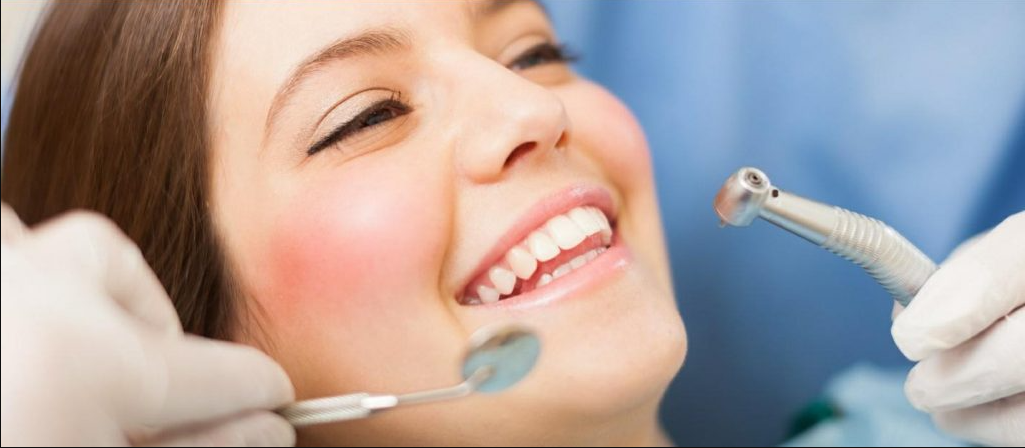
Because of being part of this agency, the Board is able to enjoy more efficient processes and resources which helps enhance the protection of public health. This merger is beneficial in the delivery of dental care to the public and the maintenance of the standards of conduct by the practicing dentists in the state of Indiana.
Features
- Dentist Licensing: Reviews applications for practitioners and grants licenses to dentists and dental hygienists practicing in Indiana.
- Practice Monitoring: Enforcement to dental care and safety standards compliance.
- Consumer Protection: Handles complaints from patients and ensures no malpractice is done in dental procedures.
7.State Psychology Board
The State Psychology Board is part of the Indiana Professional Licensing Agency which consolidates the management of numerous vocational licenses.

This pro division arrangement maintains coordination of regulations and simplifies the process for issuing licenses to psychologists throughout the state. Having this agency enables the Board to optimize the administration of licensing, surveillance of ethical conduct, and enforcement of policies with minimal duplication of effort.
This systematized framework allows the psychologists to exercise professional judgment while safeguarding the public health, safety, and welfare in the use of mental health services throughout Indiana.
Features
- Psychologist Licensing: Reviews qualifications of clinical psychologists and other professionals and the grants certificates.
- Ethical Standards: Polices professional behavior and mandated education.
- Mental Health Safety: Aids the public by restricting qualified practitioners from providing un monitored care.
8.Indiana Physical Therapy Committee
The Committee on Physical Therapy of Indiana functions under the Indiana Professional Licensing Agency, which consolidates numerous domains under one regulatory body.
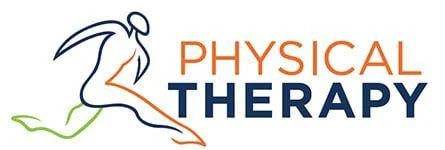
Such an arrangement improves efficiency by unifying administrative procedures and monitoring systems across the region. Belonging to this agency enables the Committee to administer the qualification and practice control of physical therapists with adequate supervision and minimal administrative workload.
This cohesive approach enhances the protection of the public while ensuring the provision of safe and reliable physical therapy services throughout Indiana.
Features
- Therapist Licensing: Credentialing of physical therapists and assistants.
- Practice Regulation: Enforcement of treatment and ethical standards.
- Professional Development: Ensures quality of care by fostering participation in educational activities.
9.Respiratory Care Committee
The Indiana Professional Licensing Agency includes the Respiratory Care Committee as one of its constituents. This is because it is a one of a kind body which manages the licenses of several healthcare services under the same head.
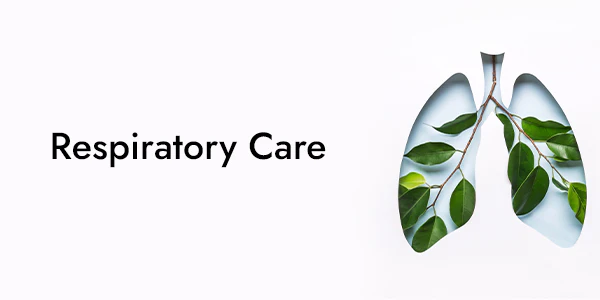
Such a system balances the different requirements and ensure uniform policies for all the therapists across the state. The Committee, which operates under the Agency, is able to take advantage of the central control.
Thus, it is easier to enforce the health protections required to be licensure and welfare for the public. This consolidative measure enhances the capability of respiratory care practitioners to extend appropriate care throughout Indiana.
Features
- Licensing Respiratory Therapists: Issuing documents governing scope of practice in respiratory care.
- Practice Standards: Developing criteria that ensures effective and safe respiratory intervention.
- Public Safety: Researchs the complaints as well as ensures adherence to the health mandate.
10.Occupational Therapy Committee
The Occupational Therapy Committee is an entity under the Indiana Professional Licensing Agency (IPLA), which amalgamates the regulation of several health professions.
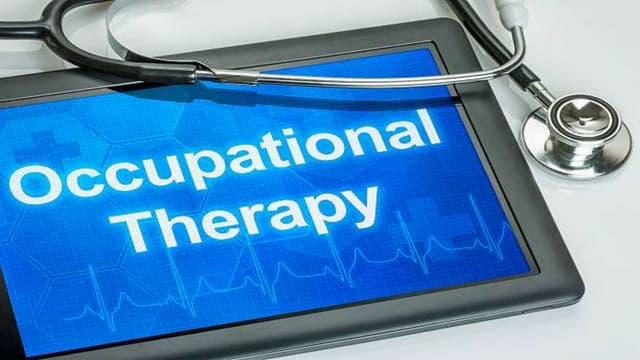
Indiana can maintain a uniform approach to the procedures of licensing and oversight at different levels of government owing to this particular mechanism.
Being part of this agency enables the Committee to allocate these resources and processes, guaranteeing the occupational therapy and procedures documented by the Committee are of eminent quality. This model further strengthens the protection of the public while promoting the provision of occupational therapy services in Indiana.
Features
- Occupational Therapist Licensing: Grants licensure to professional occupational therapists and occupational therapist assistants.
- Regulatory Oversight: Oversees adherence to practice protocols as well as standards of conduct.
- Patient Care: Monitors the safety and efficacy of the rehabilitation interventions offered by the therapists.
Conclusion
The Indiana Professional Licensing Agency is critical in coordinating the regulation and licensing of various professions throughout the state.
The agency’s centralized structure enhances the professional as well as public benefit in terms of efficiency, consistency, and transparency. Through reducing administrative burden, the agency promotes collaboration among different boards and committees which helps maintain standards of practice and protects the health and safety of the public.
As shown, the Professional Licensing Agency helps ensure the quality of services and trust among people in the state of Indiana profoundly.









